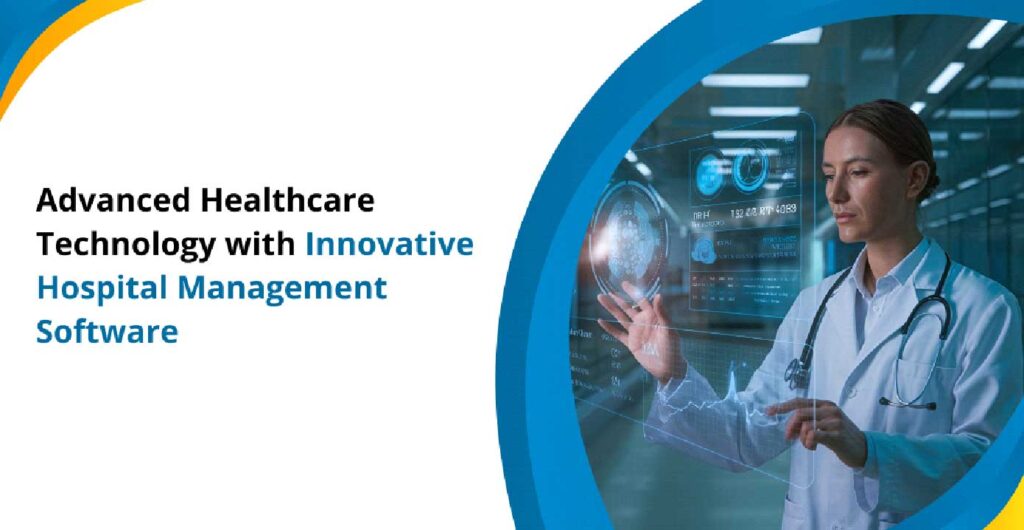Table of Contents
Quick Summary
New, latest medical technology is transforming hospital functioning with latest, high-end solutions that make them more effective and efficient in the treatment of patients. With growing demand for hospital management software in India, doctors are adopting intelligent tools that help in admin management, patient records, billing, and workflow management. Sophisticated hospital software management facilitates enhanced co-ordination of departments, data security, and quick decision-making. With the use of advanced Hospital Management Software, hospitals can save time, increase productivity, and deliver an interruption-free patient experience while maximizing operations as a whole.
Introduction:
The health care sector is transforming at a very fast pace with emerging technologies of the future that bring innovation and efficiency to the running of hospitals. New Hospital Management Software In India is emerging to automate the complex procedures and ensure flawless patient care and accurate information. Computer-based solutions assist in streamlining mundane tasks and enhancing reliability.
A complete Hospital Management Software System has all the functions that are performed in healthcare ranging from OPD Management and IPD Management to Ambulance Management and emergency management. Modules pre-installed such as the Pharmacy Management System, Laboratory Management System, and Radiology Information System also support medical services with reliable reports and real-time results.
Apart from that, features like HRMS Management, MRD Management, and high-level E-billing system simplify administration management. With hospital software innovations being done, medical professionals can avoid errors caused by manual processes, increase patient satisfaction, and achieve enhanced efficiency ultimately establishing a well-organized and tech-focused hospital environment.
Understanding Hospital Management Software
With the hectic medical world now, clinics and hospitals need digital solutions that enable seamless operation of operations and improved patient care. A hospital management system is a rescue when things come down to it. By combining different functions into one system, it makes patient registration to billing a snap, and enables seamless interdepartmental coordination.
The best hospital software in India is designed to meet the particular needs of medical professionals and to offer them ease, precision, and agility. New hospital software does not just perform tedious administrative tasks but also optimizes decision-making through instant facts and figures. From appointment scheduling to reporting, it allows physicians to invest more hours on patient care than paperwork.
With higher hospital computerized software management, health care organizations can exert greater resource management, minimized error, and precise medical records. This computerization is the key to the development of an adaptable and reliable Healthcare System.
With the help of a computerized hospital management system, hospitals can enhance the degree of accuracy in service, patient satisfaction, and a well-organized environment where technology and medicine become merged with perfection.
Core Modules of Hospital Management Software
The modern Hospital Management Software System has various modules for smooth operation, improved patient care, and improved hospital efficiency. Some of the key modules include:
OPD Management – It automates out-patient registrations, appointments, and consultations for quick processing of the patients.
IPD Management – It handles in-patient admissions, bed allocation, treatment schedules, and discharge summaries in an efficient way.
Ambulance Management – Coordinates ambulance availability, routes, and emergency requests for immediate patient transfer.
Pharmacy Management System – Keeps current drug inventory, prescription history, and error-free billing.
Laboratory Management System – Streams test orders, report generation, and sample tracking perfectly in the new millennium.
Radiology Information System – Automates imaging orders, report archiving, and diagnostic equipment integration.
Inventory Management – Automates medical supplies, stock levels, and automatic reorder notifications.
Asset Management – Oversees hospital equipment, maintenance timetables, and utilization efficiency.
HRMS Management – Automates the attendance of staff, payroll, and shift management for workforce efficiency.
MRD Management – Retains patient records in electronic form, with safe access and simple retrieval on demand.
E-billing System – Generates accurate bills, settles insurance claims, and erases human errors.
AI – Diagnostic Recommendations – Takes advantage of the application of artificial intelligence in assisting physicians in decision-making, improving accuracy in preparing treatments.
All of these modules transform hospitals into more coordinated, patient-focused, and cost-saving institutions where quality health care is rendered with increased efficiency in the present age of technology.
Integration of Healthcare Technology
The use of advanced health care technology has transformed the functioning of hospitals, to the extent of standardizing work processes and making patient care uniform. Hospital software vendors now develop innovative solutions through combining different modules into packaged hospital software systems in order to run them smoothly.
The modern hospital management system integrates clinical, administrative, and financial operations on a single platform. Patient registration from admission to discharge is fully electronic for speed and accuracy. Similarly, medical billing software offers flawless billing, insurance claim processing, and open book financials.
Hospital Information Management System (HIMS) can be helpful in bringing the patient information into the limelight, which may be accessed from any department. The majority of the healthcare professionals today are looking for the best hospital software in India that is both customizable and scalable enough to handle hospitals of varying sizes.
Other such combinations such as Workforce Management System automate payroll and staff rosters, and a Risk Management System provides operation risk identification and mitigation. Visitor Management Systems also benefit hospitals by offering systematic monitoring and security of patient visitors.
Through the implementation of hospital software, healthcare organizations can become more effective, improve patient satisfaction, and long-term growth in a competitive digital health care business.
Challenges and Solutions in Implementing Hospital Software
Hospital Management Software Implementation In India is on the rise, yet the majority of healthcare units are facing implementation challenges. One such key problem is change resistance because employees would oppose switching from traditional practices to those based on computers. Training required and learning curve are also the reasons for slow uptake. On top of that, data security and healthcare laws become concerns when hospitals adopt advanced Hospital Software.
There also lies the question of integration of different modules like Hospital Management Software System, Hospital Information Management System, and EMR/EHR Software. Without proper integration, silos of data would be formed, and this would lead to inefficiency in hospital operations as well as patient care. Budget also comes in the way since small hospitals cannot afford to spend on acquiring better systems without options to scale up.
The solutions are staged rolled out, with the modules rolled out sequentially by hospitals based on priority. Ease of implementation by being uncomplicated in nature with detailed training sessions for doctors, nurses, and personnel facilitates ease of implementation. Cloud solutions are scalable and economical and can be supported even by small hospitals. Overall, robust security features and real-time updating safeguard confidential patient data. With strategic deployment, hospitals can bridge the challenges and achieve optimal benefits of digital evolution.
Conclusion
The future healthcare technology led by paradigm Hospital Management Software is turning the hospital operation and patient care game on its head. Whether the OPD and IPD functions or maintaining the billing, diagnostics, and records on track, it injects efficiency and dependability into each department. By having pharmacy, lab, radiology, and HRMS modules, hospitals can opt to offer end-to-end integration and patient-focused services. Since digital transformation has already commenced, one needs to integrate today’s advanced hospital software in order to create smarter, safe, and future-proof healthcare systems.




